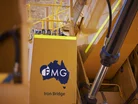Fortescue to invest US$6.2bn to into decarbonisation

Fortescue Metals Group has announced that by 2030, there would be US$6.2bn capital investment into its heavy industry decarbonisation strategy, as it looks to eliminate fossil fuel risk and reduce operating costs by US$818m per year.
Decarbonisation in mining and net-zero ambitions
The group’s heavy industry decarbonisation strategy aims to eliminate fossil fuel use and achieve real net-zero terrestrial emissions (Scope 1 and 2) across its iron ore operations by 2030. The investment will eliminate Fortescue’s fossil fuel risk profile and enable it to supply its customers with a carbon free product, a statement explained.
The strategy will see the Company lead the market in terms of its response to growing customer, community, and investor expectations to reduce/eliminate carbon emissions, the statement continued.
It added that Fortescue expects to generate attractive economic returns from its investment arising from the operating cost savings due to the elimination of diesel, natural gas, and carbon offset purchases from its supply chain.
Furthermore, the group is well positioned to capitalise on its first-mover advantage and its ability to commercialise decarbonisation technologies.
“There’s no doubt that the energy landscape has changed dramatically over the past two years and this change has accelerated since Russia invaded Ukraine. Fortescue, FFI and FMG, is moving at speed to transition into a global green metals, minerals, energy and technology Company, capable of delivering not just green iron ore but also the minerals, knowledge and technology critical to the energy transition," said Dr Andrew Forrest AO, Fortescue Executive Chairman.
“Consistent with Fortescue’s disciplined approach to capital allocation, this investment in renewable energy and decarbonisation is expected to generate attractive economic returns for our shareholders through energy cost savings and a sharp reduction in carbon offset purchases, together with a lower risk cost profile and improvement in the integrity of our assets.”
Sustainable mining
Fortescue made the announcement at the invitation of US President Biden’s First Movers Coalition and the United Nations Global Compact, with the Secretary General of the United Nations at the CEO roundtable on ‘Business leadership to rescue the Sustainable Development Goals’.
Fortescue also announced that the Science Based Targets Initiative (SBTi), will verify and audit its emissions reduction. This technical auditing initiative was instituted to ensure companies reach their Paris Agreement goal to limit global warming to 1.5 degrees.
When fully implemented, Fortescue’s decarbonisation strategy and associated investment will provide significant environmental and economic returns by 2030, including:
- Avoidance of 3m tonnes of CO2 equivalent emissions per annum
- Net operating cost savings of US$818m per annum from 2030, at prevailing market prices of diesel, gas and Australian Carbon Credit Units (ACCUs)
- Cumulative operating cost savings of US$3bn by 2030 and payback of capital by 2034, at prevailing market prices
- Elimination of Fortescue’s exposure to fossil fuels and associated fossil fuel price volatility which in turn, will de-risk the operating cost profile
- Removal of the Company’s exposure to price risks associated with relying on carbon offsets as well as carbon tax regulatory risk
- Establish a significant new green growth opportunity by producing a carbon free iron ore product and through the commercialisation of decarbonisation technologies
- Ensuring future access to green driven capital markets.
The capital estimate is US$6.2bn, with the investment largely planned in FY24-28. This investment includes the deployment of an additional 2-3 GW of renewable energy generation and battery storage and the estimated incremental costs associated with a green mining fleet and locomotives.
The capital expenditure to purchase the fleet will be aligned with the scheduled asset replacement life cycle and included in Fortescue’s sustaining capital expenditure, the statement said. It added that studies are underway to optimise the localised wind and solar resources.
The investment is expected to generate a positive net present value (NPV) through enabling the displacement of approximately 700m litres of diesel and 15m GJ of gas per annum by 2030, as well as the associated reduction in CO2 emissions.
Fortescue has already made significant effort in decarbonising its iron ore operations through its successful green fleet trials and innovation, acquisition of Williams Advanced Engineering (WAE), and a partnership with Liebherr that was announced in June this year.
Building on Fortescue’s announcement in March 2022 to develop with FFI and WAE the world’s first regenerating battery electric iron ore train, feasibility studies are progressing, with delivery of the first parabolic (gravity powered) drive trains to the Infinity locomotives scheduled to be operational by the end of 2026.



